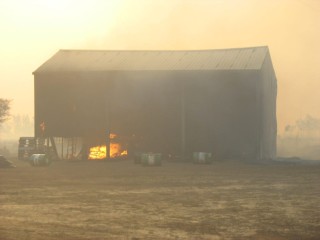 Rural producers are being warned to prepared for the coming fire season, which has the potential to be the worst in some years.
Rural producers are being warned to prepared for the coming fire season, which has the potential to be the worst in some years.
NSW Department of Primary Industries director of emergencies, Barry Kay, says farmers should be on alert and know what they are going to do to protect livestock and infrastructure this coming fire season.
“Off the back of a string of remarkable seasons and above average rainfall, the whole of rural NSW is at risk with fuel loads not seen since the early 1970,” Mr Kay said.
“In a comparable season, the 1970s fires devastated inland NSW and destroyed some 60,000 animals, hundreds of thousands of kilometres of fencing and crops and pasture.
“Farmers can put in place simple precautions now to protect themselves and minimise the impacts of fire on your property and livestock.”
NSW Rural Fire Service Commissioner Shane Fitzsimmons said that it was important farmers were ready for the coming fire season.
“While the rains over the past two years were needed to end the drought, they have presented some challenges for the upcoming bush fire season, including increased fuel loads and the delay of many planned hazard reductions.
“While the NSW RFS has worked hard to complete as many hazard reductions as possible, the risk of bush and grass fires remains very real.
“I encourage farmers to visit the RFS’ website www.rfs.nsw.gov.au where they will find easy to follow information about how to protect their family, home and property ahead of the coming bush fire season,” Commissioner Fitzsimmons said.
Preparing for grass fires:
- Having well maintained firebreaks along fence lines or around your home, shed and storage areas which can slow a fire’s spread;
- Have a well maintained area around your home, such as lawns, paths or gardens. Keep the grass cut;
- Seal under floor spaces to stop embers entering under your house and other infrastructure;
- Make sure you’ve got water for firefire fighting, in case a fire is on your property. Have water tanks filled and connected to a pump;
- Have a diesel pump. Electric pumps won’t work during a fire if the power goes out;
- Store things like fuel or woodpiles well away from your house;
- Check the access to your property. Ensure cattle grids or bridges can hold the weight of a fire truck;
- Make sure you’ve got adequate levels of insurance for your home, contents, machinery and crops or stock; and
- Consider fire proofing your stock watering systems.
Mr Kay said that as we move into the peak fire season, farmers should also check machinery for any faults or mechanical defects which could start a fire.
“Stockowners should also put in place a plan for protecting livestock in the case of an emergency, including knowing the best places where livestock can be moved to give them the greatest chance of survival,” Mr Kay said.



HAVE YOUR SAY